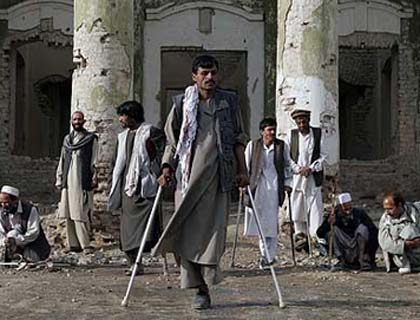Recently bits and pieces of the reports detailing war crimes and atrocities of 80s and 90s have been hitting media. The 800-page report titled "Conflict Mapping in Afghanistan since 1978" is prepared by the Afghanistan Independent Human Rights Commission and group of 40 international and Afghan researchers over six years of field work. It names about 500 individuals—including former militia leaders who denounced violence after the fall of the Taliban and joined the new setup and democratic process in Afghanistan — in detailed reporting of the evidence of over two decades of atrocities, including mass graves.
The report was supposed to be published months ago, but President Karzai and his international backers have suppressed its publication fearing backlash from those named in the report, who now hold strong positions in the government, or have mass political backing.
Human rights and civil society activists are concerned if the report will ever be published. Some express fears that publication of the report could lead to serious troubles and ethnic strife, as it names figures like national hero Ahmad Shah Massoud. Some Afghan analysts and human rights activists are calling for a watered down version of the report excluding names of perpetrators, saying 'something is better than nothing'.
I don't see any prospects of this crucial report being published under the current Administration. President Karzai's stay in power is dependent on his alliance with many of the warlords responsible for 90s carnage. Karzai's promotion of patronage politics has formed the foundations of the current setup in a way that official action on the report means collapse of the system. Those 500 individuals named in the report are all in strong power positions, from Presidential Palace and Parliament to district level.
On the other hand, President Karzai is making efforts for release of Taliban leaders from Guantanamo, including two notorious commanders responsible for the massacre in Mazar-e-Sharif and named in the report. He will not let it be published. When Karzai calls Taliban, who slaughter Afghans every day, his "brothers" and ask Mullah Omar to contest elections, the entire concept of transitional justice becomes a joke.
The Conflict Mapping report was commissioned under the Action Plan for Peace Justice and Reconciliation in 2005, which later led to parliamentary approval of the blanket immunity bill, the National Stability and Reconciliation Law in 2007. They kept space for themselves even in the Action Plan commitments with vague phrases such as accountability and acknowledgement of Afghans' suffering with improvement of 'national unity'. President Karzai will now use that law for negotiations with Taliban.
Besides, there is lack of interest from the international community for publication of the report. President Karzai's backers, particularly the US, will seek to prevent its publication given the NATO withdrawal deadline and Obama Administration's rush for a political settlement with the Taliban.
However, the fears that publication of the Conflict Mapping report could lead to serious civil strife are genuine. Far from official action, mere public debate about the report could increase strife given the fragile ethnic atmosphere in Afghanistan. For instance, country's national hero, Ahmad Shah Massoud is one of those named in the report. Every ethnic figure from 90s is hero for one, and villain for the other in public. Our people are highly sentimental on such issues, and it can easily fuel the fire of ethnic tensions across the country.
The report could change minds of some educated urban Afghans about the images created around the ethnic figures, but it can lead to tensions among majority ordinary people who are more vulnerable to the manipulations of warlords, who can take cover behind ethnic walls and fuel strife to protect themselves from accountability.
Under the current circumstances in Afghanistan, with increasing fears of civil war after withdrawal of international troops, and the fact that the Karzai Administration has no will to publish the report, and its international backers shy away, the urgency of its release is more important as a history lesson than prospects of justice for victims. It is to tell our people what civil war does, and that, more or less, everyone suffered.
It seems the Karzai Administration will suppress the report, but it will come out in public one day, leaked, if not officially. Realizing the fragile atmosphere and fears of increased tensions among people, now rights activists are increasingly calling for publication of the report, without naming anyone as perpetrators. Perhaps that's better than entirely suppressing the story of our wounds. If justice cannot heal, telling the story might.

